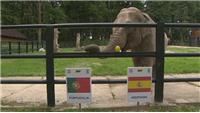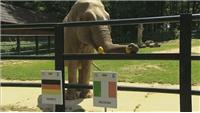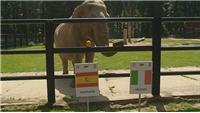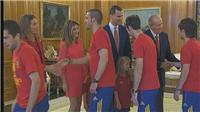
AUCKLAND, Oct 22 (Reuters) - An army in black of all ages and backgrounds invaded the Auckland waterfront on Saturday at the start of a mass celebration they hope will culminate in an overdue rugby World Cup triumph for New Zealand.
A Pacific islands nation, which has endured five fruitless tournaments since the All Blacks won the inaugural 1987 tournament, is in the mood to party after staging a spectacularly successful tournament.
International Olympic Committee president Jacques Rogge, a former flanker in the Belgian national team, joined the chorus of praise this week when he said the tournament had made an international impact.
“What they see on television is absolutely fabulous,” he said. “I think this will do a lot of good for rugby, but also a lot of good for New Zealand.”
Sunday’s final on an antipodean spring evening will feature the two teams who met during a winter’s afternoon in 1987.
France, the volatile southern European side who have twice knocked the All Blacks out of the World Cup, have stumbled rather than strutted into their third final. They remain, though, the northern hemisphere side New Zealanders fear most with their ability to rip up the form book and tear apart the opposition.
Rugby union has been part of the fabric of a colonial society since Charles John Munro introduced a game devised in the English public schools to the South Island province of Nelson in 1870.
SPRINGBOK RIVALRY
“Rugby football was the best of all out pleasures,” wrote John Mulgan, author of the New Zealand classic novel “Man Alone.”
“It was religion and desire and fulfilment all in one.”
Rugby also represented an opportunity for a fledgling pioneer nation to make its mark in the old world, which it did with notably successful tours of the United Kingdom in 1905 and 1924.
The rivalry which defined New Zealand rugby was the battle for world supremacy with the South African Springboks for most of the 20th century. A Springbok tour in 1956 became a national crusade to redeem a crushing 4-0 series loss in South Africa in 1949.
New Zealand was consumed with what seems in retrospect an unhealthy obsession with beating the Springboks. The mission was completed when the hulking All Blacks flanker Peter Jones ran 40 metres to score the winning try in the fourth test at Eden Park, venue of Sunday’s final.
The relationship with South Africa and its increasingly reviled racial apartheid policies was to scar New Zealand.
It led to an African boycott of the 1976 Montreal Olympics in protest at an All Blacks tour of the white-ruled republic in the same year and virtual civil war on the streets between pro and anti-tour demonstrators on an ill-advised South African visit in 1981.
MULTI-CULTURAL SOCIETY
The evil of apartheid has long been banished and New Zealand is a far different country from the small 1956 nation, populated primarily by people of English, Scots and Irish descent, when rugby last captured the popular imagination to such an extent.
Today Auckland—“last, loneliest, loveliest, exquisite, apart” in the words of Rudyard Kipling in “The Song of the Cities”—is a multi-cultural harbour city with a large Polynesian and growing Asian population.
Support for the All Blacks is spread throughout the communities and giant advertisements featuring the All Blacks drape department stores while black banners featuring the silver fern, the symbol on the All Blacks’ shirts, fly from cars and the small suburban weatherboard houses.
“In God we trust but please God let us beat them,” reads one homemade sign.
Colin Meads, the uncompromisingly brilliant if sometimes unacceptably violent All Blacks forward who spanned the 1960s and who has written a newspaper column throughout the tournament, is the closest thing New Zealand rugby has to a deity.
An anecdote recounted by writer and television broadcaster Ian Fraser sums up the enduring appeal of Meads and the game he played so well which still grips the New Zealand imagination.
“There’s a story that’s told of a little back country church in the King Country and the words up there in letters of fire on the side of the church, “If Jesus Christ came to the King Country tomorrow, what would you do? And somebody had written underneath, “Play him at lock and put Colin Meads on the side of the scrum.”
- Arbeloa: Spain must never change their style
- Wedding bells turn Iniesta's legs to jelly
- Pele: Brazil's 1970 World Cup winners better than Spain
- Pirlo: Only Spain are superior to Italy
- Spain disproved boring tag with empathic final win, insists Alonso
- Fernando Torres revels in Euro 2012 crown
- Italy can reach the final at World Cup 2014
- Johan Cruyff: I enjoyed Italy and I'm a big fan of Del Bosque's Spain
- De Gea & Mata named in Olympics squad
- Shevchenko: Euro 2012 was a success for Ukraine
Hot News
- Funny Balotelli!
- Spanish fans celebrate Euro Cup win
- That's German WAGS!
- The sexy female fans in Euro 2012
- Euro 2012: Spain fans celebrate victory
- Spain vs Italy in clash of the Euro WAGs
- Euro 2012 Final - Spain 4 : 0 Italy, Part 2
- Germany knocked out by Italy
- Natalia Siwiec blasts Sol and the BBC
- Coleen Rooney reveals her bikini body secrets
- Italy's fans celebrated wildly
- Euro 2012 Final - Spain 4 : 0 Italy, Part 1
| Rank | Team | W/D/L | Pts |
|---|
Cities & Stadiums
The Top 3 Teams of Previous Tournaments
| Year | Winners | Runner-up | Third place |
|---|---|---|---|
| 2008 | Spain | Germany | Russia / Turkey |
| 2004 | Greece | Portugal | Netherlands / Czech Republic |
| 2000 | France | Italy | Netherlands / Portugal |
| 1996 | Germany | Czech Republic | France / England |
| 1992 | Denmark | Germany | Netherlands / Sweden |
| 1988 | Netherlands | Soviet Union | Italy / West Germany |
| 1984 | France | Spain | Denmark / Portugal |
| 1980 | West Germany | Belgium | Czechoslovakia |
| 1976 | Czechoslovakia | West Germany | Netherlands |
| 1972 | West Germany | Soviet Union | Belgium |
| 1968 | Italy | Yugoslavia | England |
| 1964 | Spain | Soviet Union | Hungary |
| 1960 | Soviet Union | Yugoslavia | Czechoslovakia |




